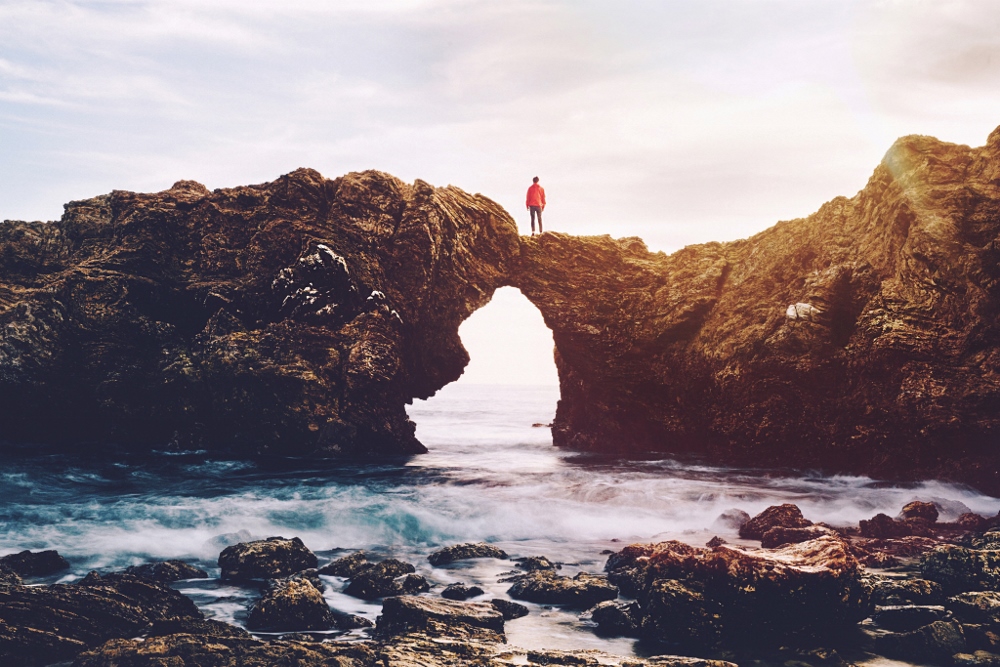
(Unsplash/Austin Neill)
To know what will come is a certain kind of grace I wish I had. To know in advance my struggles so preparations can be made. To know the joys so I can quell my worries. To know the future, where I will be and how things will go — what a relief that would be!
That isn't my grace, however, or any of ours. Each day, we wake up without firm knowledge of what will come. The only truth is that the sun will rise and set again. Everything in between is what happens when we put one foot in front of another.
That is life's great adventure, the not knowing what will happen next — the push and shove, the trial and joy between the waking and lying down. It's the in-between that poet Mary Oliver was talking about when she asked, "What is it you plan to do with your one wild and precious life?"
To know what will happen is to have that decision made for you — a difficult truth I find hard to accept. Life isn't easy and many things can happen that one never expects. Often these trials are a mixture of things we can control and things we can't, making their resolution hard to grasp. Shattered expectations paired with unanticipated suffering pin us down, leaving us few places to turn. If we knew what was going to come, these things could be avoidable.
But we can't avoid them, which means we need to prepare for them. And Lent is a time for just that.
The passion of Christ teaches us many things, but the lesson that is most powerful for me is that he who knew exactly what was going to happen suffered anyway. Could he have avoided it? Of course. But his plan for his one wild and precious life was the redemption of ours and nothing was going to stand in his way, not even his own doubts.

Christ on the Mount of Olives (1517), detail from the altar of the Church of St. Clare in Nuremberg, Germany (Wikimedia Commons/Wolfgang Sauber)
That resolve was nurtured for 40 days in the desert. There, Jesus fought temptation so that when the ultimate temptation came — to let the cup pass — he didn't turn away. Lent is the same for us, a time to strengthen our resolve so that when hard times come, God is where we first turn, not what we first turn away from.
How easy that is to say, yet how hard that is to do! It's a big risk to believe in something you can't see and, furthermore, believe that it will help in your suffering. Of course, the church gives us tools to hedge this risk. Cultivating the practices of prayer, fasting and almsgiving helps us overcome uncertainty. They also strengthen our resolve in the face of temptation.
But it's still a risk and I'm a calculated person when it comes to taking risks. I like to know outcomes, numbers and back-up plans. I know I would fail miserably on Wall Street because I don't have the stomach to make big decisions quickly. The only thing I don't doubt is that I'm exactly like doubting Thomas. If Jesus appeared before me in flesh and blood, I would have to touch the holes in his hands. I couldn't risk not knowing.
But Jesus said to Thomas, "Have you come to believe because you have seen me? Blessed are those who have not seen and have believed" (John 20:29).
God asks us to take a risk on him, even though we don't know with certainty what will happen next. Thankfully, God doesn't sit on a golden throne in the heavens far away. He became one of us in everything but sin — he suffered like us, cried like us, and dealt with his own uncertainties like us.
Advertisement
God loves us, from up close, next to us, and as one of us.
What a relief that is! If we can't know what will come, at least we know that the one who will help us through whatever comes is close to us. The practices of prayer, fasting and almsgiving help us to see that more clearly, bolstering our resolve and strengthening our faith. They also help us learn more deeply the meaning of God's love.
For in prayer we grow in relationship with the one who loved us into being, in fasting we learn that it's God who sustains us, and in giving we learn of the gifts that God gave us. These practices reveal to us the primacy of his love, for from it we exist and the good that we do points back to it.
And what is love? Love is a wonderful, wild and precious risk worth taking. Love is giving everything but not knowing what is next.
Love is what we are all searching for, especially in our suffering. When we want to know what is going to happen next, when we are frustrated by life's uncertainties and pinned down by life's suffering, it is the love of God that will help us through.
To not know what will come — that is a gift worth cherishing, even if it's hard to accept. It allows us to ask the most beautiful question, "What is it you plan to do with your one wild and precious life?"
To love without limits, to trust in God's saving hand, and to have faith in the glorious resurrection that awaits.
May it be so.
[Christian Mocek is director of alumni relations at St. Meinrad, a Benedictine monastery, seminary and school of theology in southern Indiana. You can find his reflections on parenthood, marriage and young adulthood at mocekmusings.com.]
Editor's note: We can send you a newsletter every time a Young Voices column is posted to NCRonline.org. Go to this page and follow directions: Newsletter sign-up.






